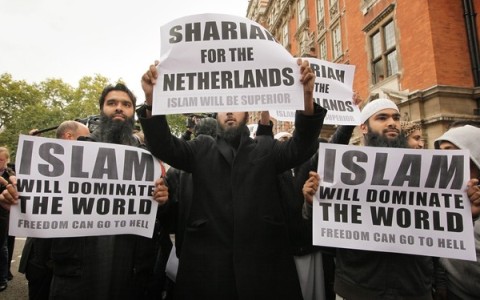New report claims ‘participation’ will usher political Islam into Europe
by - 18th July 2014

ACCORDING to a new report increased participation in public affairs, rather than a rise in radicalisation, will deliver political Islam into Europe.
The ‘Trojan Horse’ infiltration of Birmingham schools, the report says, being a typical 'participationist' strategy of gradual take over of traditions and institutions.
Islamism in Europe by Dr Lorenzo Vidino, Senior Fellow at the Center for Security Studies, ETH Zurich (Swiss Federal Institute of Technology) suggests that Western governments must understand that radical Islam – or political Islam – has both violent and non-violent faces but the latter will pose the real threat to Western society.
According to Vidino, political Islam’s ‘lack of homogeneity’ is characterised by three main groups: violent rejectionists (in his paper he uses ‘jihadists’), non-violent rejectionists and participationists.
Each of these components of political Islam has a different presence, structure, and modus operandi. Jihadists are understood because they are ‘homegrown’ but Europeans still have a limited understanding of the other two segments of the movement.
‘Rejectionists’
‘Violent rejectionists – often inspired by al Qa'eda – reject participation in the democratic system and use violence to advance their goals,’ says Vidino. They are the main targets of European counter-radicalisation programs.
According to Vidino, ‘Non-violent rejectionists such as Salafists and Hizb ut-Tahrir, reject any government not based on Islamic law, but do not openly advocate violence to further their goals.’
Salafism has attracted a growing number of European Muslims through its claims of simplicity, meaning and moral superiority,’ Vidino adds. Recruitment of Salafist parents onto committees was shown as one strategy used in Birmingham schools.
Hizb ut-Tahrir (HT) ‘officially aims at disseminating its ideology and challenging the existing status quo without resorting to violence,’ according to Vidino. HT’s ‘rhetoric is tailored to Western Muslims ears. Members are highly educated young professionals who are second-generation Muslim immigrants in Europe.
‘Participationists’
Vidino sees ‘the numerically most significant component of political Islam in Europe: the Muslim Brotherhood and other participationist Islamic Movements. They will interact with society at large through grassroots activism and participation in public life.’
 The characteristics of this participationist role are, according to Vidino, ‘precisely outlined in Priorities of the Islamic Movement in the Coming Phase, published in 1990 by the top Muslim Brotherhood ideologue Yusuf al-Qaradawi. His book says Muslim minorities in so many countries have ‘an unprecedented opportunity’ to represent the Islamic Movement and, in Qaradawi's words, can ‘play the role of the missing leadership of the Muslim Nation [umma]’ in shaping the minds of Muslim immigrants living in the West.
The characteristics of this participationist role are, according to Vidino, ‘precisely outlined in Priorities of the Islamic Movement in the Coming Phase, published in 1990 by the top Muslim Brotherhood ideologue Yusuf al-Qaradawi. His book says Muslim minorities in so many countries have ‘an unprecedented opportunity’ to represent the Islamic Movement and, in Qaradawi's words, can ‘play the role of the missing leadership of the Muslim Nation [umma]’ in shaping the minds of Muslim immigrants living in the West.
‘Create your own Muslim ghetto,’ Qaradawi says, ‘with a web of Islamic centers, think tanks, magazines, mosques, and conferences so that the Islamic Movement can spread its politicised version of Islam among Western Muslims.’
At the same time, Qaradawi advocates moderation and relative openness when dealing with non-Muslims: ‘At least in these early stages confrontation can only damage the movement, whereas displaying a moderate façade will allow the Brothers to operate under the radar screen.’
Highlighting common values, the Brothers, in fact, present themselves as a moderate force encouraging Muslims to simultaneously participate in society and spread their Islamic principles, which, ultimately, benefit everybody.
Vidino concludes, ‘By leveraging such a relationship, in fact, the Brothers aim at being entrusted by European governments with administering all aspects of Muslim life in each country. They would, ideally, become those whom governments task with preparing the curricula and selecting the teachers for Islamic education in public schools, appointing imams in public institutions such as the military, the police or the prison service, and receiving subsidies to administer various social services.’
Trojan Horse
The five-pronged strategy presented in the leaked document describing ‘Operation Trojan Horse’ very much reflects Qaradawi’s vision for the spread of the Islamic Movement in the West. It is the archetype of the participationist strategy: educational institutions are gradually infiltrated, and taken over; there is no outbreak of violence; the key is intense pressure, creating a culture of fear and intimidation in schools, and forcing teachers out of their jobs.
The report concludes that political Islam is expanding its territory in the west, with Birmingham typical of this strategy: moderate Islamic expression is radicalised, the proliferation of mosques and partly by taking over traditions and institutions.
Rare violent incidents of physical violence give participationists the possibility to side with the government against the ‘bad guys’ of Islam while proclaiming themselves the ‘good guys’. The effect is a vicious circle of appeasement policies by local authorities that facilitates the further spread of political Islam, and leaves the non-Muslim population defenseless or otherwise provokes an unwelcome ‘far right’ sentiment in society.
Frans Veerman is the director of World Watch Research, which commissioned the report.
